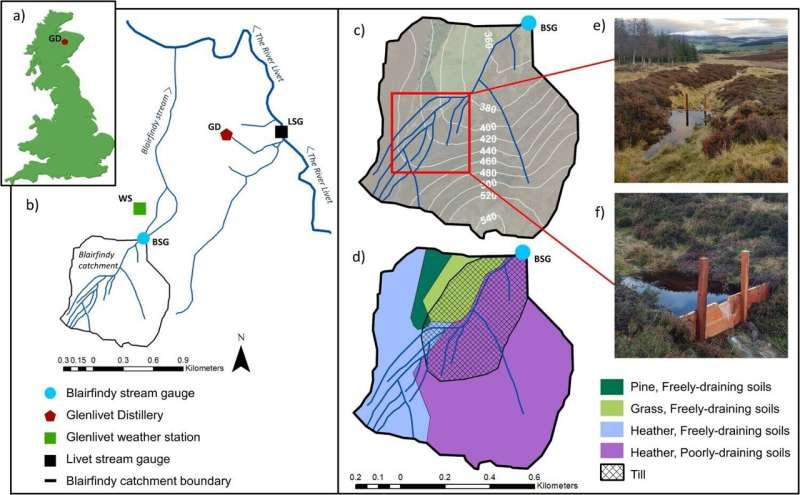Researchers team up with the Glenlivet distillery to protect whisky production

Researchers from the University of Aberdeen and James Hutton Institute have worked with The Glenlivet distillery to introduce environmentally sustainable solutions at Chivas Brothers' Speyside distillery to address water scarcity and protect whisky production.
Among the nature-based measures are small dams in the landscape supplying the distillery, designed to capture water during wet periods and to make this available when water is scarce.
Led by Ph.D. student Jessica Fennell, who has had a special "Fennell Reserve" whisky created by The Glenlivet in her honor, the project is intended to help prevent the closure of the distillery during dry periods.
Last month's heat wave saw temperatures soar across Scotland, and such periods are predicted to become more frequent due to climate change. Many distilleries have had to temporarily stop distilling in recent summers because of water shortages, costing the industry millions. During the dry summer of 2018 groundwater supplies to The Glenlivet distillery decreased and did not replenish until the following spring.
After initially surveying the landscape to determine where dams would best protect groundwater supplies, the study team used a combination of field data collection and modeling tools to provide insights into how they operated once installed.
Jessica said: "Our results found that the features we installed will have a small but positive impact that could help increase water availability during periods of water scarcity and reduce flood peaks during high rainfall. Crucially, this could prevent the distillery closing during dry periods which has a significant cost impact.
"Because these measures enhance groundwater recharge, and groundwater contribution to streams, our research has also raised the possibility of positive implications for water temperature. This is important because distilleries require cool water and groundwater is typically colder than surface water during summer.
"As water temperature is expected to increase with climate change, more water will be needed to achieve the same cooling effects, and increased groundwater flow could help stabilize stream temperatures as well as increase flows through dry summer periods."
Dr. Josie Geris, from the University's School of Geosciences, supervised Jessica and is a co-author of the study, which was funded by NERC and Chivas Brothers, owners of The Glenlivet. Other co-authors include Dr. Mark Wilkinson from the James Hutton Institute and Dr. Ronald Daalmans, environmental sustainability manager at Chivas Brothers. Their findings have been published in the International Journal for River Basin Management.
Dr. Geris commented: "Water scarcity may become a significant issue in Scotland in the future, and here we have shown that these nature-based solutions offer a cost effective, environmentally beneficial approach to water resource management that can be applied to this economically vital sector—there may also be a benefit in terms of securing groundwater supplies.
"The lessons learned can also potentially be applied to other areas of the economy that rely on private water supply and bring other potential benefits, for example in flood management, improvements to biodiversity and water quality, the restoration of upland habitats, and carbon storage."
Dr. Daalmans added: "Our aim is to ensure all our distilleries operate within the local capacity of their catchment to provide water, particularly during low flows. This research has indicated that the land within the catchment could be used to help mitigate the impacts of climate change on water availability.
"This is important for the long-term viability of the distillery, but could also benefit the entire Scotch Whisky industry, especially in upland areas. We intend to continue monitoring the effect of the measures on water availability at this site over the long term."
More information: Jessica Fennell et al, Assessing the role of location and scale of Nature Based Solutions for the enhancement of low flows, International Journal of River Basin Management (2022). DOI: 10.1080/15715124.2022.2092490
Provided by University of Aberdeen




















